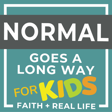
101: The Sparrow’s Nest - Empowering Young Families
Every December at Messiah St. Charles, we have a Christmas Mission offering. The offering benefits local organizations chosen by staff and congregants. One of the previous recipients was The Sparrow’s Nest; More than childcare. We seek to come alongside young families with the love of Christ to educate, equip, and empower both the parent and the child. Through our innovative childcare cooperative families enrolled in our program will receive free childcare, mentorship, and case management to reach their family goals.
Katie Lyczak is the Executive Director at The Sparrow’s Nest and she joined Jill Devine to talk about the mission of The Sparrow’s Nest, as well as how they used the offering from Messiah.
One way you can support The Sparrow’s Nest is through their annual fundraising dinner on Friday, September 27, 2024. VIP tickets include open bar, appetizers, and a meet-and-greet with our featured guest, Jennifer Maggio.
Normal Goes A Long Way Website: https://www.normalgoesalongway.com/
Normal Goes A Long Way Instagram: https://www.instagram.com/normalgoesalongway/
Normal Goes A Long Way Facebook: https://www.facebook.com/Normal-Goes-A-Long-Way-110089491250735
Normal Goes A Long Way is brought to you by Messiah St. Charles: https://messiahstcharles.org/
Seeking The Still: https://seekingthestill.com/
Two Kids and A Career: https://www.jilldevine.com/podcast
Normal Goes A Long Way is hosted on Zencastr. Get 20% off when you choose Zencastr for your podcasting needs: https://zencastr.com/?via=jill

